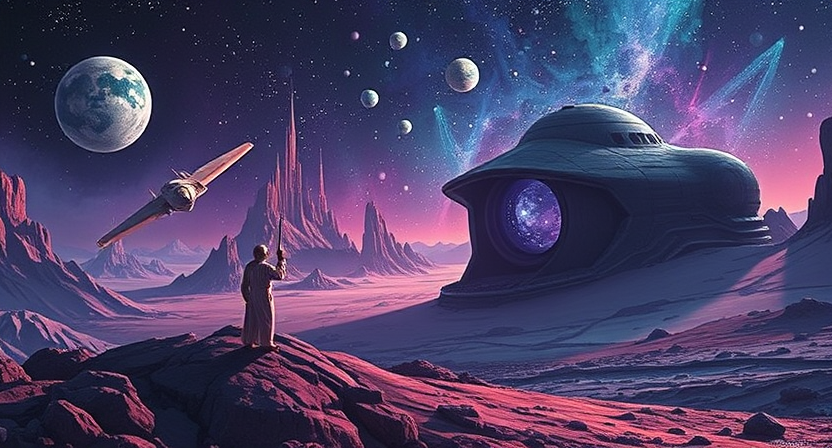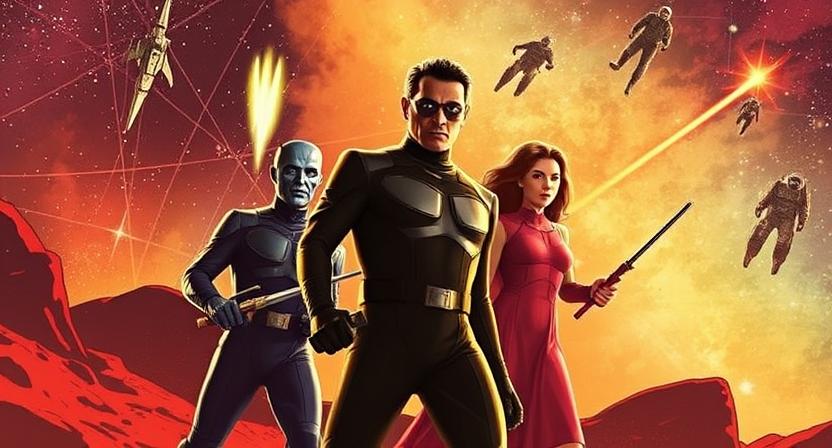Top Mind-Bending Sci-Fi TV Series to Watch
Immersing yourself in the realm of sci-fi TV series is a necessity for those who crave perplexing narratives and explosive plotlines. These shows have an uncanny ability to stretch the limits of our minds, challenging our very understanding of reality. From unraveling futuristic technologies to plunging into alternate dimensions, the premier mind-bending sci-fi TV series promise a viewing experience like no other, keeping you on your toes with their dizzying twists and turns.
Among these enigmatic series shines “Black Mirror,” renowned for its innovative storytelling and intricate themes. This anthology-style masterpiece delves fearlessly into the sinister side of technology and its profound impact on society, blurring the lines between fact and fiction with each thought-provoking scenario it presents. With every episode offering a fresh take on modern-day dilemmas, “Black Mirror” is an enthralling expedition through complexities that will undoubtedly leave you pondering the repercussions of our tech-saturated world more deeply than ever before.
• “Stranger Things” transports viewers to the 1980s with its nostalgic setting and supernatural elements, weaving a captivating tale of government experiments, parallel dimensions, and a group of endearing kids at the center of it all.
• “Westworld” explores the boundaries of artificial intelligence and consciousness in a futuristic theme park where guests can live out their wildest fantasies. The series delves into philosophical questions about identity, morality, and free will amidst stunning visuals and mind-bending twists.
• “The Expanse” takes us on an interstellar journey through political intrigue, conspiracy theories, and conflicts between Earth, Mars, and the Belt. With complex characters and intricate world-building, this sci-fi epic offers a rich tapestry of storytelling that will keep you hooked from start to finish.
The Influence of Science Fiction on Popular Culture
The undeniable impact of science fiction on popular culture is like a whirlwind, swirling through various forms of media and shaping societal norms in mysterious ways. From the mind-bending technology of tomorrow to the enigmatic civilizations beyond our wildest dreams, the imaginative worlds depicted in sci-fi TV series have ignited sparks of creativity and innovation across diverse industries. Through their thought-provoking themes and speculative storytelling, science fiction serves as a catalyst for new ideas and pushes the boundaries of what we once believed possible.
But there’s more to it than meets the eye. Sci-fi TV series delve deep into contemporary issues and unravel the complexities of human existence with an air of mystery. By presenting us with alternate realities and bleak futures, these shows offer a tantalizing glimpse into potential consequences of current societal trends. The influence of science fiction on popular culture transcends mere entertainment; it acts as a cryptic reflection of our own world, urging us to ponder deeply about where society is headed next.
• Science fiction TV series ignite sparks of creativity and innovation across diverse industries
• Thought-provoking themes and speculative storytelling push the boundaries of what is possible
• Sci-fi shows delve into contemporary issues and unravel complexities of human existence with mystery
• Offer a glimpse into potential consequences of current societal trends
• Influence on popular culture acts as a reflection of our own world, urging deep contemplation about society’s future
Exploring Alternate Realities in Sci-Fi TV Series
The concept of alternate realities has always been a mind-boggling exploration in the realm of sci-fi TV series. These parallel universes offer a dizzying array of possibilities, where characters meander through divergent versions of reality, stumbling upon alternate iterations of themselves and delving into how their decisions could have unraveled into drastically different outcomes. The unraveling of alternate realities beckons an immersive plunge into philosophical quandaries regarding destiny, autonomy, and the essence of being.
Viewed through the kaleidoscopic lens of alternate realities, sci-fi TV series prod viewers to mull over the enigma of multiverse theory and the notion that each choice we make might potentially splinter off into an entirely new dimension. Characters often find themselves grappling with the repercussions of their choices in these parallel planes, compelling them to confront their own convictions and drives. As spectators are guided through this labyrinthine odyssey across various realms, they are prompted to contemplate the intricacies of human existence and ponder upon the boundless potentials that may lie beyond our narrow understanding of reality.
• The concept of alternate realities in sci-fi TV series offers a unique exploration of parallel universes
• Characters navigating through divergent versions of reality encounter alternate iterations of themselves
• Delving into how decisions could lead to drastically different outcomes sparks philosophical musings on destiny and autonomy
• Multiverse theory and the idea that choices can create new dimensions provoke contemplation on human existence
• Viewers are encouraged to ponder the limitless possibilities beyond our conventional understanding of reality as they journey through different realms
The Evolution of Sci-Fi TV Series Over the Decades
From the early days of black-and-white television to the high-definition streaming platforms of today, sci-fi TV series have undergone a remarkable evolution over the decades. What was once considered niche or even campy entertainment has transformed into some of the most critically acclaimed and culturally relevant shows on air. With advancements in technology and storytelling techniques, sci-fi series have pushed the boundaries of imagination and creativity, captivating audiences with their innovative concepts and compelling narratives.
As the genre has grown in popularity, sci-fi TV series have become more sophisticated in their approach to themes such as artificial intelligence, time travel, and dystopian futures. What was once seen as purely escapist entertainment is now a platform for exploring complex moral and ethical dilemmas, challenging viewers to question the impact of technology on society, and reflecting on the human condition itself. With a diverse range of settings, characters, and storylines, sci-fi TV series continue to push the boundaries of what is possible, inviting audiences to ponder the unknown and contemplate the future.\n
• Sci-fi TV series have evolved from niche entertainment to critically acclaimed shows
• Advancements in technology and storytelling techniques have enhanced the genre
• Themes such as artificial intelligence, time travel, and dystopian futures are explored more deeply
• The genre now challenges viewers to consider moral and ethical dilemmas
• Sci-fi series reflect on the impact of technology on society and the human condition
Innovative Storytelling Techniques in Sci-Fi TV Series
In the realm of science fiction TV series, the use of innovative storytelling techniques has become a defining feature of captivating narratives. Through non-linear storytelling, flashbacks, and parallel storylines, viewers are thrust into a multi-layered viewing experience that defies traditional norms. By intricately weaving together complex plotlines and character arcs, these shows transport audiences to uncharted realms of imagination and creativity.
Moreover, some sci-fi series take it a step further by employing unconventional narrative structures like unreliable narrators, dream sequences, and time loops to blur the boundaries between reality and fiction. This bold approach not only keeps viewers guessing but also challenges them to ponder the very nature of storytelling itself. By pushing the limits of conventional methods, these TV series beckon audiences to delve into the enigmatic unknown and embrace boundless possibilities of the mind.
• Non-linear storytelling
• Flashbacks
• Parallel storylines
Moreover, some sci-fi series take it a step further by employing unconventional narrative structures like:
• Unreliable narrators
• Dream sequences
• Time loops
This bold approach not only keeps viewers guessing but also challenges them to ponder the very nature of storytelling itself. By pushing the limits of conventional methods, these TV series beckon audiences to delve into the enigmatic unknown and embrace boundless possibilities of the mind.
Unforgettable Characters in Sci-Fi TV Series
The enigmatic allure of Sci-Fi TV series lies in their enigmatic characters, whose enigmatic essence lingers in the minds of viewers long after the final credits roll. From valiant protagonists confronting cosmic perils to enigmatic anti-heroes grappling with ethical quandaries, these characters infuse profound complexity and breadth into the otherworldly realms they inhabit. Their idiosyncratic personas, motivations shrouded in mystery, and tumultuous inner battles strike a chord with audiences, etching an indelible mark on the landscape of science fiction narratives.
Whether it be a cunning sentient being born from code, an intrepid voyager traversing uncharted galaxies, or a tormented extraterrestrial mediator torn between duty and conscience, each character adds layers of bewilderment and intensity to the unfolding tale. Viewers are entranced by their odysseys, fervently cheering for them to overcome adversity and metamorphose into something greater over time. These unforgettable figures not only propel the storyline forward but also act as reflections of our own perplexing humanity, mirroring our dreams, anxieties, and ambitions within a futuristic tapestry.
• In the realm of Sci-Fi TV series, certain characters have left an indelible mark on viewers’ minds
• These characters range from valiant protagonists to enigmatic anti-heroes, each with their own complexities and inner battles
• Viewers are drawn to these characters’ odysseys and root for them to overcome challenges and evolve over time
• The unforgettable figures in Sci-Fi TV series not only drive the plot forward but also serve as mirrors reflecting our own humanity within a futuristic setting
The Impact of Technology on Sci-Fi TV Series
The perplexing and bursting realm of technology has long been a focal point in sci-fi TV series, molding the landscapes and storylines depicted on screen. From sophisticated artificial intelligence to otherworldly gadgets and intricate virtual realms, technology stands as a cornerstone that propels the narrative forward and enthralls viewers. It grants creators the ability to delve into boundless possibilities of what tomorrow may unveil, igniting creativity and prompting contemplation on the role of technology in society.
Within numerous sci-fi TV series, technology is frequently portrayed as a paradoxical entity, presenting both awe-inspiring advancements and foreboding repercussions. Whether it be the potential for human augmentation through cybernetics or the perils of unrestricted surveillance via cutting-edge monitoring systems, technological portrayals in these shows often echo our own anxieties and aspirations for what lies ahead. By exploring the intricacies and ethical dilemmas surrounding technological evolution, these series compel audiences to ponder the ramifications that such progress could bring upon our existence and planet at large.
• Technology in sci-fi TV series serves as a cornerstone that propels the narrative forward and enthralls viewers
• It grants creators the ability to delve into boundless possibilities of what tomorrow may unveil
• Technology is frequently portrayed as a paradoxical entity, presenting both awe-inspiring advancements and foreboding repercussions
• These portrayals often echo our own anxieties and aspirations for what lies ahead
• Sci-fi TV series compel audiences to ponder the ramifications of technological evolution on society and the planet
Futuristic Settings in Sci-Fi TV Series
The enigmatic allure of sci-fi TV series lies in their ability to transport viewers to ethereal realms beyond the confines of our conventional realities. These otherworldly settings, brimming with advanced technologies and avant-garde architecture, offer a tantalizing glimpse into the boundless possibilities of our future. From celestial cities suspended in the heavens to desolate wastelands ravaged by cataclysmic events, the array of futuristic landscapes depicted in these series is as diverse as it is perplexing.
Every intricate detail within these fantastical realms is meticulously crafted by dedicated set designers and visual effects teams, who labor tirelessly to breathe life into these visionary worlds on screen. Whether it be a sleek starship hurtling through the cosmos or a sprawling cyberpunk metropolis ablaze with neon hues, each futuristic setting serves as a portal for viewers to transcend their mundane existence and embark on an exhilarating journey through uncharted territories.
• The celestial cities suspended in the heavens create a sense of wonder and awe among viewers.
• Desolate wastelands ravaged by cataclysmic events evoke feelings of desolation and despair, adding depth to the storyline.
• Advanced technologies showcased in these futuristic settings spark imagination and curiosity about what our future may hold.
• Avant-garde architecture adds a touch of sophistication and elegance to these otherworldly landscapes, making them visually captivating.
Exploring Time Travel in Sci-Fi TV Series
The concept of time travel is a perplexing and thrilling theme that permeates many sci-fi TV series, leaving audiences in a state of awe at the boundless possibilities and mind-bending paradoxes it presents. Shows like “Doctor Who” and “Dark” plunge viewers into a whirlwind of complexities as they unravel the intricate threads of time travel, delving deep into the ramifications of altering past events and the moral quandaries that arise from tampering with the fabric of time itself.
As viewers are swept along on this turbulent journey through time, they find themselves pondering the profound implications of rewriting history and how it could reverberate throughout both the present and future. The juxtaposition of fate versus free will becomes a central focal point as characters navigate through an ever-shifting landscape of timelines, encountering alternate versions of themselves and grappling with the consequences wrought by their choices.
These sci-fi gems not only challenge our perceptions but also ignite fervent discussions about existence, causality, and the fluidity of reality itself. By peeling back layers upon layers within these narratives, we are compelled to question our very understanding of time’s enigmatic nature – sparking curiosity in exploring the interconnected tapestry woven between past, present, and future.
• Time travel is a perplexing and thrilling theme in sci-fi TV series
• Shows like “Doctor Who” and “Dark” delve deep into the ramifications of altering past events
• Viewers ponder the implications of rewriting history and its reverberations
• Fate versus free will becomes a central focal point as characters navigate through timelines
• Sci-fi series ignite discussions about existence, causality, and reality itself
The Role of Artificial Intelligence in Sci-Fi TV Series
The enigmatic presence of artificial intelligence (AI) in sci-fi TV series has cast a spellbinding aura over the narrative landscape. From enigmatic robots to intricate computer systems, AI personas often blur the boundaries between humanity and machinery, igniting profound discussions on consciousness and morality. These AI entities transcend mere plot devices, serving as catalysts for character development and delving into profound themes like identity and the essence of our existence.
In the realm of sci-fi television, artificial intelligence emerges as a paradoxical force embodying both benevolence and malevolence, mirroring society’s ambivalent sentiments towards technological advancements. These enigmatic AI figures beckon viewers to ponder upon the moral quandaries surrounding sentient creations and the repercussions of surrendering ourselves to advanced technologies. By unraveling the mysteries of AI behavior and its entwined fate with human counterparts, sci-fi TV series afford us a glimpse into our symbiotic relationship with technology and the unforeseen ramifications of granting autonomy to our own inventions.
• The portrayal of AI in sci-fi TV series often challenges our perceptions of consciousness and morality
• AI entities serve as catalysts for character development and exploration of profound themes like identity and existence
• AI in sci-fi television embodies both benevolence and malevolence, reflecting society’s mixed feelings towards technology
• Viewers are prompted to contemplate moral dilemmas surrounding sentient creations and the consequences of technological advancements
• Sci-fi TV series offer insights into the symbiotic relationship between humans and technology, highlighting potential ramifications of granting autonomy to AI.
Dystopian Societies in Sci-Fi TV Series
Dystopian societies emerge as a recurring motif in the realm of sci-fi television, unveiling worlds shrouded in bleakness and tyranny where individuals find themselves entangled in perplexing predicaments. These fictional realms often operate as cautionary vignettes, delving into the repercussions of unbridled authority, societal dominance, and technological progressions. Viewers are thrust into futuristic panoramas where authoritarian regimes reign with an unforgiving grip, populace stripped bare of liberties, while simmering dissent festers just beneath the surface.
Within these dystopian landscapes, characters grapple with intricate moral quandaries, wrestle with the erosion of personal autonomy, and confront humanity’s darkest inclinations head-on. The meticulous world-building within these sci-fi sagas is bursting at the seams with minute details that construct a desolate backdrop where distinctions between right and wrong become indiscernible. Audiences are compelled to ponder on society’s fragility, champion individuality against all odds, and contend with the looming specter of a dystopian tomorrow.
• Dystopian societies serve as cautionary tales in sci-fi TV series
• Authoritarian regimes rule with an iron fist, stripping away liberties
• Characters face moral dilemmas and struggle with loss of personal autonomy
• Detailed world-building creates a desolate backdrop where right and wrong blur
• Viewers are prompted to reflect on society’s fragility and champion individuality
The Influence of Literature on Sci-Fi TV Series
The enigmatic realm of literature has served as a wellspring of inspiration for sci-fi TV series, offering a tapestry of intricate narratives, enigmatic characters, and mind-bending themes for creators to unravel. These iconic shows have masterfully woven the threads of classic literary works into their storytelling tapestries, reshaping and reimagining them to craft mesmerizing television spectacles that resonate across continents. By tapping into the profound depths and expansive horizons of literary storytelling, these series plunge headfirst into existential quandaries, stretch the limits of imagination, and unveil novel perspectives on the human experience.
From bleak dystopian sagas to sweeping space odysseys, literature has bestowed upon sci-fi television an abundant trove of creative fodder for generating innovative concepts and enthralling story arcs. By drawing from the vast reservoirs of literary tradition, TV visionaries infuse their creations with a weighty sense of intellectual heft, anchoring their fantastical realms in familiar motifs and enduring themes that have enthralled readers through ages past. This fusion between literature and television not only enriches the sci-fi landscape but also elevates the medium itself – proving that riveting storytelling transcends conventional boundaries when it comes to drawing inspiration from written prose.
• Sci-fi TV series often draw inspiration from classic literary works such as “Brave New World” or “1984”
• The incorporation of literary themes adds layers of complexity and depth to the storytelling in these shows
• By reimagining and reshaping familiar narratives, sci-fi TV series offer fresh perspectives on timeless ideas
• Literature provides a rich tapestry of characters, settings, and plot devices that can be seamlessly integrated into television scripts
Gender Representation in Sci-Fi TV Series
The evolution of gender representation in sci-fi TV series has left many viewers perplexed and intrigued. In the past, female characters were often confined to narrow stereotypes, serving as mere damsels in distress or love interests for their male counterparts. However, a burst of change has swept through the genre in recent years, bringing forth a new wave of empowered women on screen.
Gone are the days of one-dimensional portrayals; now we see strong, independent female characters taking charge and defying expectations. They lead with intelligence and agency, shattering old norms and paving the way for a more diverse representation of femininity in sci-fi.
And it doesn’t stop there – male characters are also undergoing a transformation. No longer bound by rigid definitions of masculinity, they are exploring vulnerability, emotionality, and sensitivity on screen. This shift towards complexity challenges traditional notions of heroism and intellectuality among male leads.
As these changes unfold before our eyes, we witness a richer tapestry of human experiences being woven into the fabric of sci-fi storytelling. The once static landscape is now bursting with diversity and inclusivity, offering audiences a more realistic reflection of society’s ever-evolving values and norms.
• Female characters are no longer confined to narrow stereotypes
• Strong, independent women are taking charge on screen
• Male characters are exploring vulnerability and sensitivity
• Sci-fi TV series now offer a more diverse representation of femininity and masculinity
• The evolving gender representation reflects society’s changing values and norms
Exploring Moral and Ethical Dilemmas in Sci-Fi TV Series
Delving into the intricate web of moral and ethical quandaries within sci-fi TV series is a compelling narrative tool that leaves viewers pondering the enigmatic nature of humanity and society. These dilemmas thrust characters into tumultuous waters, compelling them to navigate through murky waters where distinctions between right and wrong blur into obscurity. Through the presentation of futuristic scenarios and perplexing ethical puzzles, these shows challenge audiences to scrutinize their own convictions and values, urging them to confront the repercussions of their decisions in an unfamiliar realm.
The unparalleled capacity of sci-fi TV series to explore a myriad of moral and ethical dilemmas – from probing the ethics surrounding artificial intelligence to contemplating the ramifications of genetic manipulation – captivates viewers by offering a fresh perspective on contemporary ethical discourses. By weaving together thought-provoking narratives with intricate character dynamics, these shows ignite fervent discussions about morality and ethics that echo long after the final scene fades to black.
• Sci-fi TV series delve into intricate moral and ethical quandaries
• Characters are thrust into tumultuous waters where distinctions between right and wrong blur
• Futuristic scenarios and perplexing ethical puzzles challenge audiences to scrutinize their own convictions
• Shows explore a myriad of dilemmas, from artificial intelligence ethics to genetic manipulation ramifications
• Thought-provoking narratives ignite fervent discussions about morality and ethics
The Importance of World-Building in Sci-Fi TV Series
In the realm of sci-fi TV series, world-building is a perplexing and bursting component that whisks viewers away to intricate and immersive realms beyond our understanding. With meticulous attention to detail, creators craft unique planets, societies, and technologies that ignite curiosity and spark imagination in audiences. Envisioning futuristic cities, alien landscapes, or advanced civilizations invites viewers on thrilling adventures into uncharted territories where possibilities are limitless.
A well-constructed world not only sets the stage for the narrative but also shapes the overall tone and atmosphere of the show with bursts of complexity. By exploring various realms and cultures, creators delve into complex themes, societal structures, and moral dilemmas that add layers of depth to characters’ journeys. The rich backdrop provided by a developed world allows characters to navigate through endless possibilities while interacting with their surroundings in ways that push boundaries beyond what is known.
Ultimately, world-building in sci-fi TV series acts as a gateway to boundless imagination where endless possibilities unfold before viewers like bursts of creativity waiting to be explored.
– World-building in sci-fi TV series whisks viewers away to intricate and immersive realms
– Meticulous attention to detail crafts unique planets, societies, and technologies
– Envisioning futuristic cities, alien landscapes, or advanced civilizations invites viewers on thrilling adventures
– A well-constructed world shapes the overall tone and atmosphere of the show with bursts of complexity
– Exploring various realms and cultures delves into complex themes, societal structures, and moral dilemmas
– The rich backdrop provided by a developed world allows characters to navigate through endless possibilities
The Influence of Politics on Sci-Fi TV Series
The enigmatic interplay of politics has forever been a mesmerizing force in shaping the intricate tapestries of various sci-fi TV series. These shows, with unparalleled expertise, weave political themes into their narratives to unravel the tangled web of complex societal issues, offering a distorted reflection of reality through the lens of a futuristic or alternate dimension. From totalitarian regimes to government corruption and power struggles, these shows plunge deep into the labyrinthine world of politics to convey profound messages that leave audiences pondering.
Moreover, the portrayal of political systems in sci-fi TV series often serves as a cryptic warning or an enigmatic commentary on the perplexing landscapes of contemporary politics. By crafting imaginary realms where political ideologies are magnified or twisted beyond recognition, these shows compel viewers to question their own beliefs and values. Through spellbinding storytelling and elaborate world-building, sci-fi series possess an uncanny ability to ignite conversations about the repercussions of politics on society and the untold ramifications of unrestrained authority.
• The portrayal of totalitarian regimes in shows like “The Handmaid’s Tale” or “1984”
• Government corruption depicted in series such as “House of Cards” or “Battlestar Galactica”
• Power struggles within political systems showcased in shows like “Game of Thrones” or “The Expanse”
• Imaginary realms created to magnify and twist political ideologies for commentary on contemporary politics
Exploring Alien Worlds and Species in Sci-Fi TV Series
The enigmatic realms and enigmatic beings of alien worlds have forever enthralled audiences in the realm of science fiction television, whisking them away to uncharted galaxies and unveiling fantastical creatures. From the tribal Na’vi dwelling on Pandora in “Avatar” to the shape-shifting Founders lurking within “Star Trek: Deep Space Nine,” these extraterrestrial realms and species inject a profound sense of complexity and fascination into the narrative.
The sheer ingenuity and meticulousness required to fashion these otherworldly entities and their environments epitomize the limitless creativity possessed by writers, directors, and special effects teams alike. Whether it be the insectoid Formics portrayed in “Ender’s Game” or the cryptic Engineers featured in “Prometheus,” the plethora of alien worlds and species found within sci-fi TV series present boundless avenues for exploration and revelation.
• The Na’vi from Pandora in “Avatar” showcase a deep connection to nature and spirituality.
• The shape-shifting Founders in “Star Trek: Deep Space Nine” add layers of intrigue and mystery to the series.
• The insectoid Formics in “Ender’s Game” bring a sense of danger and threat to the storyline.
• The cryptic Engineers in “Prometheus” raise questions about humanity’s origins and purpose.
The Use of Symbolism in Sci-Fi TV Series
Symbolism in sci-fi TV series is a labyrinth of enigmatic messages and explosive imagery, designed to captivate the mind and ignite contemplation. Through intricate visual metaphors and cryptic representations of profound concepts, these symbols create a kaleidoscope of meaning for viewers to decipher and dissect. The interplay between light and darkness, the reflections in mirrors revealing alternate truths, or the recurring motifs woven with specific colors all contribute to an intricate tapestry that enriches the narrative.
Moreover, symbolism in sci-fi TV series acts as a portal into realms of societal commentary, philosophical ponderings, and existential quandaries. An ever-present maze may symbolize the complexities of human consciousness or the arduous path towards self-discovery. Symbols can also delve into themes of power struggles, technological advancements, or the hubris of playing deity. In essence, symbolism in sci-fi TV series adds layers upon layers of complexity for audiences to unravel and ruminate upon – a mesmerizing journey into depths unknown.
• Symbols in sci-fi TV series create a kaleidoscope of meaning for viewers to decipher and dissect
• The interplay between light and darkness, reflections in mirrors, and recurring motifs with specific colors enrich the narrative
• Symbolism acts as a portal into realms of societal commentary, philosophical ponderings, and existential quandaries
• Symbols may delve into themes of power struggles, technological advancements, or the hubris of playing deity
• Symbolism adds layers upon layers of complexity for audiences to unravel and ruminate upon
The Evolution of Special Effects in Sci-Fi TV Series
The role of special effects in shaping the visual storytelling of sci-fi TV series has been nothing short of extraordinary. From the humble beginnings of practical effects like prosthetics and miniatures to the revolutionary use of computer-generated imagery (CGI) in modern productions, the evolution has been truly mind-boggling. These advancements have enabled creators to breathe life into fantastical realms, futuristic gadgets, and alien creatures in a manner that mesmerizes viewers and plunges them into the storyline like never before.
As technology hurtles forward at breakneck speed, the realm of possibilities for special effects in sci-fi TV series is expanding exponentially. With virtual reality, augmented reality, and other cutting-edge technologies on the horizon, creators can now push narrative boundaries even further by crafting immersive worlds that are visually breathtaking beyond belief. The progression of special effects hasn’t just heightened the visual appeal of sci-fi TV shows but has also unlocked new avenues for inventive storytelling and world-building.
• Special effects have played a crucial role in shaping the visual storytelling of sci-fi TV series
• Advancements from practical effects to CGI have revolutionized the industry
• Creators can now breathe life into fantastical realms and alien creatures like never before
• Technology is rapidly advancing, opening up new possibilities for special effects in TV series
• Virtual reality and augmented reality are on the horizon, promising even more immersive worlds
• The evolution of special effects has not only enhanced visual appeal but also expanded creative storytelling opportunities
Exploring the Unknown in Sci-Fi TV Series
Amidst the vast and infinite expanse of the cosmos, sci-fi TV series embark on a journey into the enigmatic unknown with an insatiable curiosity that knows no bounds. These shows possess a mesmerizing ability to transport viewers to distant galaxies, alternate dimensions, and parallel universes, offering fleeting glimpses of surreal worlds that defy all logic and reason. Through their intricate narratives and dazzling visuals, they challenge audiences to unravel the mysteries of existence and explore the boundless possibilities that lie beyond the confines of our mundane reality.
In their quest to unravel the enigma of the unknown, sci-fi TV series boldly venture into uncharted territories by introducing perplexing scientific theories, philosophical conundrums, and existential dilemmas that push the boundaries of conventional storytelling. By intertwining elements of advanced technology, space exploration, temporal manipulations, and encounters with otherworldly beings, these shows ignite contemplation and ignite debates about what it means to be human in a universe teeming with uncertainty. Through their mind-bending narratives, they beckon us to ponder what lies beyond our current understanding and embrace the thrilling unpredictability of undiscovered realms waiting just beyond our reach.
• As viewers immerse themselves in the captivating worlds of sci-fi TV series, they are invited to contemplate the complexities of time travel, artificial intelligence, and extraterrestrial life forms.
• The exploration of parallel universes and alternate dimensions challenges our perceptions of reality and prompts us to question the very nature of existence.
• Sci-fi TV series often serve as a mirror reflecting our fears, hopes, and aspirations for the future, offering a glimpse into what may lie ahead for humanity in an ever-evolving universe.




